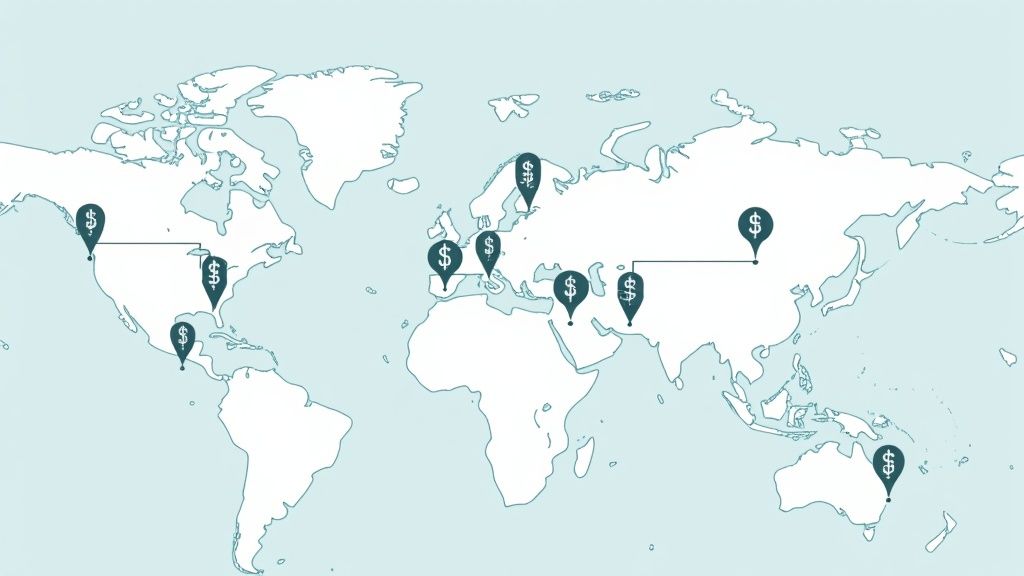
Social Media Director Salary: Key 2025 Factors
Published
Unlocking the Secrets to a Higher Social Media Director Salary
Want a higher social media director salary? This listicle reveals seven key factors influencing compensation in 2025. Understand how industry sector, company size, location, experience, education, specialized skills, and scope of responsibility impact your earning potential. Whether you're negotiating a raise or exploring new opportunities, this guide provides actionable insights to maximize your social media director salary.
1. Industry Sector
One of the most significant factors influencing a social media director's salary is the industry sector in which they work. The perceived value of social media, budget allocation for marketing, and overall revenue models vary drastically between industries, leading to a wide range in compensation for social media professionals. This difference can account for a 20-40% variance in salary, making it a crucial consideration for both current and aspiring social media directors. Understanding these industry nuances is vital for anyone looking to maximize their earning potential in this field.

Typically, sectors like technology, entertainment, and luxury consumer goods offer the highest salaries for social media directors. Companies in these industries often have larger marketing budgets and recognize the substantial impact social media can have on their bottom line. Retail and consumer packaged goods fall in the mid-range, while education, non-profits, and government sectors tend to offer lower salaries due to tighter budgets and a traditionally lower emphasis on social media marketing. For instance, social media directors at Meta or Google can earn 30-50% more than those in similar roles at universities or non-profits. Similarly, fashion and luxury brands like Louis Vuitton and Gucci often pay premium rates for digital expertise. You can learn more about Industry Sector and available opportunities.
Features:
- Varies by 20-40% across different sectors: Significant salary discrepancies exist between industries.
- Tech and entertainment typically offer top-tier compensation: These sectors place a high value on social media expertise.
- Retail and consumer packaged goods fall in the middle range: Moderately competitive salaries are common in these fields.
- Education and non-profits tend to offer lower salaries: Budget limitations often constrain compensation in these sectors.
Pros:
- Moving to high-paying sectors can dramatically increase earnings: Strategic career moves can significantly impact your income.
- Growth industries often increase social media investment over time: Opportunities for salary growth within a sector are possible as the industry evolves.
Cons:
- Higher-paying industries may have more intense performance expectations: Increased compensation often comes with greater pressure to deliver results.
- More competitive hiring process in premium sectors: Landing a top-paying role requires standing out amongst a larger pool of qualified candidates.
Tips:
- Research industry benchmarks before salary negotiations: Knowing the average salary for your target industry provides leverage during negotiations.
- Consider total compensation including stock options in tech companies: Equity can significantly increase overall compensation, particularly in the tech industry.
- Look for growing industries with increasing social media budgets: Identifying emerging sectors allows you to position yourself for future salary growth.
This item deserves its place on the list because industry sector is arguably the most influential factor in determining a social media director's salary. Understanding the industry landscape and strategically choosing a sector aligned with your career and salary goals is essential for maximizing your earning potential.
2. Company Size and Revenue
A crucial factor influencing social media director salary is the size and revenue of the company. This correlation is straightforward: larger companies with robust marketing budgets generally offer higher salaries than smaller businesses or startups. Companies generating higher revenue typically invest more in their social media presence, translating into more competitive compensation packages for those leading the charge. This makes understanding a prospective employer's financial standing a critical part of your job search and salary negotiation process.

This factor deserves a prominent place on this list because it provides a tangible benchmark for setting realistic salary expectations. By understanding this relationship, you can effectively target companies that align with your career goals and compensation requirements.
Here's a more detailed breakdown:
- Fortune 500 companies: These industry giants typically offer the highest social media director salaries, reflecting their vast resources and established market positions.
- Mid-sized companies ($10M-$100M revenue): These organizations offer mid-range compensation packages, often striking a balance between competitive salary and growth opportunities.
- Startups: While startups may offer lower base salaries, they often compensate with equity, offering the potential for significant financial gains if the company succeeds. This can be a high-risk, high-reward proposition.
Pros of Working for Larger Companies:
- Better Benefits Packages: Larger companies usually provide comprehensive benefits, including health insurance, retirement plans, and paid time off.
- Job Security: Established companies generally offer greater job security compared to the often volatile environment of a startup.
- More Resources: Larger budgets translate into more resources for campaign execution, team building, and access to advanced tools and technologies.
Cons of Working for Larger Companies:
- Bureaucracy: Larger organizations often have more complex approval processes, which can slow down project timelines.
- Complex Stakeholder Relationships: Managing larger teams and navigating intricate stakeholder relationships can be more demanding.
Examples:
- A social media director at a major tech company like Apple or Amazon might command a salary between $150,000 and $200,000+ annually, plus substantial benefits and stock options.
- The same role at a growing startup might offer a base salary ranging from $80,000 to $120,000, supplemented with equity that could potentially be worth significantly more in the future.
Tips for Job Seekers:
- Research: Thoroughly research a company's revenue and growth trajectory before interviews to understand their financial health and potential for salary growth. Sites like Glassdoor and LinkedIn can provide valuable salary insights.
- Adjust Expectations: Realistically adjust your salary expectations based on the company's size and funding stage. Don't expect startup-level equity at a Fortune 500 company.
- Consider Total Compensation: Look beyond base salary and consider the entire compensation package, including benefits, bonuses, and equity. A lower base salary with valuable equity or a comprehensive benefits package might be more attractive in the long run.
3. Geographic Location
Where you choose to live and work can drastically impact your earning potential as a social media director. Geographic location is one of the most influential factors affecting social media director salaries. Major tech hubs and metropolitan areas with high costs of living typically offer significantly higher compensation packages compared to rural or less developed regions. This disparity stems from the increased cost of living in these areas, as well as the higher concentration of companies vying for top talent. Salary variations can range from 30-100% based solely on location.

This factor deserves a prominent place on this list because understanding location-based salary differences is crucial for both job seekers and employers. For job seekers, it informs salary expectations and helps in negotiating competitive offers. For employers, it helps in structuring competitive compensation packages to attract and retain talent. While cost of living adjustments are common in major cities, they often don't fully offset the significantly higher housing costs and other expenses. The rise of remote work is slightly narrowing location-based disparities, offering exciting new opportunities. Learn more about Geographic Location and its impact on social media careers.
Features:
- Significant Salary Variations: Expect salary differences of 30-100% based on location alone.
- Remote Work Influence: The increasing prevalence of remote work is beginning to lessen, but not eliminate, location-based salary gaps.
- Cost of Living Adjustments: Major cities often incorporate cost of living adjustments into salary packages, though these may not fully compensate for higher expenses.
Pros:
- Higher Absolute Compensation: Major cities and tech hubs, like San Francisco and New York, often offer the highest social media director salaries.
- Increased Job Mobility and Opportunity: These locations generally provide more job opportunities and career advancement potential within the industry.
Cons:
- Higher Cost of Living: Increased salaries in these areas are often offset by significantly higher costs for housing, transportation, and everyday expenses.
- Competitive Job Markets: Premier locations attract a large pool of talented professionals, creating a highly competitive job market.
Examples:
- San Francisco/Silicon Valley: $140,000-$210,000
- New York City: $130,000-$190,000
- Chicago: $95,000-$140,000
- Rural areas: $70,000-$100,000
Tips for Job Seekers and Employers:
- Calculate Cost of Living: Use online cost of living calculators to compare the real value of salary offers across different locations.
- Consider Remote Work: Explore remote work opportunities with companies in high-paying locations while living in a lower-cost area.
- Explore Emerging Tech Hubs: Consider cities outside of the established tech hubs that offer growing opportunities with potentially lower living costs.
Popularized By: Remote work policies at companies like Twitter, Meta, and other tech giants have significantly shifted the landscape, making location requirements less rigid and opening up new possibilities for both employers and employees. This has also influenced how companies consider and structure their compensation packages.
4. Experience Level and Track Record
When it comes to social media director salary, experience level and a proven track record are paramount. Your years in the field, coupled with demonstrable success in social media management, directly correlate to your earning potential. This is a critical factor for both job seekers understanding their market value and employers looking to set competitive compensation. Simply put, the more experience and proven success you have, the higher your salary expectations can be. This factor deserves its place on this list because it's arguably the most significant driver of salary within this role.

As a general guideline, entry-level directors (3-5 years of experience) can expect salaries ranging from $70,000 to $95,000. Mid-career directors (5-10 years) typically earn between $95,000 and $130,000. For senior directors with 10+ years of experience, salaries can range from $130,000 to $180,000 and beyond. However, these are just baseline figures. Previous ROI metrics heavily influence compensation, pushing salaries beyond these ranges for high-performing individuals. Employers are willing to invest significantly in directors who can demonstrate a tangible, measurable impact in their previous roles, driving key business objectives through social media.
Examples of Leveraging Experience:
- A director who spearheaded a successful viral campaign that significantly boosted brand awareness and engagement could see a 10-15% increase in salary offers.
- A director who increased engagement by 200% at a previous company, driving substantial lead generation, can leverage this achievement for a higher starting salary in negotiations.
Pros:
- Cumulative Growth: Experience-based salary increases accumulate throughout your career, leading to substantial earning potential over time.
- Negotiating Power: A strong portfolio of successful campaigns provides significant leverage during salary negotiations.
Cons:
- Potential for Plateauing: Without continuous skill development and staying abreast of industry trends, career progression and salary growth can plateau.
- Transferability of Skills: Experience in one industry may not seamlessly translate to another, potentially impacting salary expectations in a new sector.
Actionable Tips:
- Meticulous Documentation: Document all campaign metrics and ROI from previous roles. Quantifiable results are crucial.
- Portfolio Development: Maintain a portfolio of case studies showcasing your most successful campaigns, detailing your strategies, execution, and achieved results.
- Continuous Learning: Pursue professional development opportunities to stay ahead of the curve and avoid skills plateauing. This could include certifications, workshops, online courses, and staying engaged with industry publications and thought leaders.
This approach of emphasizing experience and track record is especially relevant for influencer marketing professionals, digital and social media specialists, brand and content strategists, and anyone seeking remote or traditional employment in this competitive field. Recruiters and hiring managers place a high value on quantifiable achievements, so showcasing your impact is vital for maximizing your earning potential as a social media director.
5. Educational Background and Certifications: Boosting Your Social Media Director Salary
When considering factors influencing social media director salary, educational background and certifications play a significant, albeit secondary, role. While practical experience reigns supreme, your credentials can significantly impact your earning potential, especially during the hiring process and early stages of your career. This is why understanding the value of education and certifications is crucial for anyone aiming to maximize their social media director salary.
A solid educational foundation provides a theoretical understanding of marketing principles, communication strategies, and the broader business context. This background allows social media directors to develop more strategic and impactful campaigns. Certifications, on the other hand, demonstrate a commitment to professional development and mastery of specific platforms or skills, signaling to potential employers a higher level of competency.
How it Works:
The influence of education and certifications on social media director salary generally follows this pattern:
- Bachelor's Degree (Minimum Requirement): A bachelor's degree, typically in marketing, communications, journalism, or a related field, serves as the baseline for most social media director positions. This establishes your foundational knowledge.
- Master's Degree: Holding a master's degree, especially in digital marketing, marketing communications, or an MBA, can provide a potential salary premium of 5-15% compared to those with only a bachelor's degree. An MBA can offer a potentially higher premium, between 10-20%, due to its focus on business administration and leadership.
- Specialized Certifications: Each relevant certification can add another 3-8% to your potential earnings. These demonstrate proficiency in specific platforms and tools, making you a more attractive candidate.
Examples of Valuable Certifications:
Several certifications can boost your social media director salary and enhance your resume:
- Hootsuite Social Marketing Certification: Demonstrates expertise in social media management using the Hootsuite platform.
- Facebook Blueprint Certification: Validates skills in Facebook and Instagram marketing, advertising, and community management.
- Google Analytics Individual Qualification: Proves proficiency in data analysis and website traffic measurement, crucial for evaluating social media campaign performance.
- HubSpot Content Marketing Certification: Enhances content creation and strategy skills, essential for driving engagement and achieving social media objectives.
Pros:
- Formal education provides a theoretical foundation and a broader business context for strategic decision-making.
- Certifications demonstrate specific technical competencies and a commitment to professional development.
Cons:
- The return on investment for advanced degrees and certifications diminishes compared to demonstrable results and actual performance metrics. Experience ultimately carries more weight.
- Certifications require ongoing renewal and updating to stay current with evolving platform features and best practices, demanding a continuous investment of time and resources.
Tips for Maximizing Your Earning Potential:
- Target Relevant Certifications: Pursue certifications specific to the platforms most relevant to your target industries.
- Combine Credentials with Experience: Highlight both practical experience and educational credentials on your resume and LinkedIn profile to showcase a well-rounded skillset.
- Consider Specialized Master's Programs: If you're considering graduate school, explore specialized digital marketing master's programs that offer in-depth knowledge and practical training.
Why This Matters:
In a competitive job market, differentiating yourself is key. While experience is paramount, a robust educational background combined with relevant certifications can significantly influence your social media director salary. These credentials not only demonstrate your commitment to the profession but also equip you with the theoretical knowledge and practical skills necessary for success. This combination allows you to command a higher salary and advance your career in this dynamic field. The increasing popularity of official certification programs from major platforms and LinkedIn's emphasis on certification badges further underscores the value of these credentials.
6. Specialized Skills and Platform Expertise
In the competitive landscape of social media management, specialized skills and platform expertise are key drivers of higher social media director salary. This factor significantly influences earning potential because it directly correlates with a director's ability to deliver impactful results. Simply put, the more specialized your skills and the deeper your platform knowledge, the more valuable you are to an organization.
A social media director with a general understanding of various platforms won't command the same salary as someone with demonstrable expertise in specific areas. This expertise translates into more effective campaigns, better return on investment, and ultimately, greater value for the company. For example, a director skilled in Meta Ads Manager can finely tune ad campaigns to reach specific demographics and achieve lower cost-per-acquisition, directly impacting the bottom line. Similarly, a director proficient in optimizing content for the TikTok algorithm can drive significant organic reach and engagement, building brand awareness and potentially going viral.
Features and Benefits of Specialized Skills:
- Paid social advertising expertise: Proficiency in platforms like Meta Ads Manager, Twitter Ads, or LinkedIn Ads can command a 10-15% premium in social media director salary.
- Advanced analytics capabilities: Using data analysis tools and techniques to measure campaign performance and extract actionable insights can lead to a 10-20% salary increase. Think proficiency in Google Analytics, social listening tools, and even programming languages like Python or R for custom analysis.
- Content creation skills (video, graphic design): In-house content creation capabilities, particularly in high-demand areas like video production and graphic design, can add a 5-15% premium.
- Emerging platform expertise (TikTok, Discord): Staying ahead of the curve and mastering emerging platforms like TikTok and Discord, where brands are still establishing their presence, can offer an 8-12% salary advantage.
Pros:
- Competitive advantage in hiring: Specialized skills make your resume stand out and demonstrate your value to potential employers.
- Measurable performance improvements: Technical skills often translate to tangible improvements in campaign performance, leading to better results and higher ROI.
Cons:
- Requires continuous learning: The social media landscape is constantly evolving, requiring ongoing learning and adaptation to new platforms and algorithm changes.
- Balancing depth and breadth: While specializing is crucial, it's important to maintain a broad understanding of various platforms to ensure a holistic social media strategy.
Examples of In-Demand Skills:
- Meta Ads Manager expertise
- TikTok algorithm optimization
- Social listening tool proficiency (e.g., Brandwatch, SproutSocial)
- Video production and editing skills
- Python/R for social data analysis
Tips for Developing Specialized Skills:
- Develop a T-shaped skill profile: Cultivate a broad understanding of social media principles and platforms, while developing deep expertise in 2-3 specific areas.
- Stay current on platform algorithm changes: Algorithms are constantly being updated. Staying informed ensures your strategies remain effective.
- Cultivate both creative and analytical capabilities: The most successful social media directors possess a blend of creative vision and analytical prowess.
Learn more about Specialized Skills and Platform Expertise
This skillset deserves a prominent place on this list because it's a primary determinant of a social media director's earning potential. In a field driven by results, demonstrable expertise commands a premium. By focusing on developing specialized skills, you not only increase your social media director salary but also position yourself as a leader in the ever-evolving world of social media.
7. Scope of Responsibility and Team Size
A significant factor influencing social media director salary is the scope of responsibility and the size of the team managed. This encompasses everything from the number of direct reports and brands overseen to the complexity of the markets covered and the presence of budget or P&L responsibilities. Understanding these elements is crucial for both job seekers and employers when negotiating compensation for social media director roles. This factor deserves its place on the list because it directly correlates with the complexity, pressure, and ultimately, the compensation associated with the role.
A director managing a small team focused on a single brand will naturally earn less than a director orchestrating global campaigns across multiple brands with a large team. This is a direct reflection of the increased workload, strategic thinking, and leadership skills required. Here’s a more detailed breakdown:
Small team management (1-3 direct reports): This typically represents a baseline salary for a social media director. The focus is primarily on execution and day-to-day management of social media activities.
Medium team (4-8 reports): Managing a mid-sized team usually commands a 10-15% premium over the baseline social media director salary. This reflects the increased responsibility for team development, performance management, and resource allocation.
Large team (9+ reports): Directing a larger team often comes with a 15-30% premium. This increase in social media director salary is justified by the complexities of leading a larger group, fostering collaboration, and achieving strategic alignment across multiple team members.
Multi-brand responsibility: Overseeing social media for multiple brands within a company usually adds a 15-25% premium to the social media director salary. This requires a deep understanding of different brand identities, target audiences, and marketing objectives.
Global/multi-market oversight: Managing social media across different countries and cultures is a complex undertaking that usually carries a 20-35% premium. This role demands an understanding of diverse market dynamics, language nuances, and regulatory landscapes. Coordinating regional teams and adapting strategies to local contexts are key responsibilities.
Pros:
- Broader responsibility provides pathway to executive-level positions: Taking on more responsibility and demonstrating success in managing larger teams and budgets strengthens a director's profile and creates a natural progression towards senior leadership roles.
- Budget authority increases negotiating leverage: Control over budget allocation demonstrates a higher level of trust and influence within an organization, providing stronger leverage during salary negotiations.
Cons:
- Greater accountability for performance metrics: As the scope expands, so does the pressure to deliver results. Directors with larger budgets and teams are held more accountable for achieving key performance indicators (KPIs).
- More complex stakeholder management: Managing multiple brands and global markets involves navigating a more intricate network of stakeholders, requiring stronger communication and interpersonal skills.
Examples:
- A director managing social media for multiple product lines at Procter & Gamble, each with distinct target audiences and marketing goals, would likely command a higher salary due to multi-brand responsibility.
- A Global social media director coordinating regional teams across continents at Coca-Cola would command a significant premium reflecting the complexity of global market oversight.
Tips for maximizing your social media director salary based on scope and team size:
- Document team growth and development outcomes: Keep records of how your leadership has contributed to team expansion, skill development, and improved performance. Quantifiable achievements strengthen your case for a higher salary.
- Quantify budget management success in interviews: Be prepared to discuss your budget management experience and demonstrate how your decisions have led to positive ROI and the achievement of marketing objectives.
- Emphasize cross-functional leadership experience: Highlight your ability to collaborate effectively with different departments, such as sales, product development, and customer service. This demonstrates your ability to navigate complex organizational structures and achieve shared goals.
7-Point Comparison: Social Media Director Salary Factors
| Salary Factor | Implementation Complexity (🔄) | Resource Requirements (⚡) | Expected Outcomes (📊) | Ideal Use Cases (💡) | Key Advantages (⭐) |
|---|---|---|---|---|---|
| Industry Sector | Moderate adjustments; switching sectors involves strategic shifts | High-budget sectors like tech/entertainment need robust backing | 20-40% salary variation; top-tier in tech and entertainment | Transition to technology, entertainment, or luxury brands | Elevated earning potential; growing media investments |
| Company Size and Revenue | High complexity; navigating corporate structures and processes | Enterprise-level companies offer substantial resources | 30-40% premium at Fortune 500 firms; mid-range for growing companies | Roles in established or high-revenue companies | Better benefits, job security, and larger marketing budgets |
| Geographic Location | Variable complexity; requires cost-of-living adjustments | Major hubs demand higher operational resources | 30-100% salary differences based solely on location | Tech hubs and metropolitan areas with elevated living costs | Higher absolute compensation and increased mobility |
| Experience Level and Track Record | Progressive; requires concrete ROI and measurable campaign success | Investment in professional growth and continuous learning | Clear career-based increments; senior roles earn significantly more | Experienced professionals with 10+ years and proven metrics | Strong negotiation leverage and impactful portfolio |
| Educational Background and Certifications | Low to moderate; differentiates baseline from premium credentials | Commitment to ongoing education and certification renewals | 5-20% salary premium based on advanced degrees and certifications | Early career entrants or those seeking formal education advantages | Validated expertise and enhanced professional credibility |
| Specialized Skills and Platform Expertise | High initial learning curve; involves mastering advanced tools | Continuous investment in specialized and technical training | 5-20% premium for competencies such as analytics and paid advertising | Candidates possessing niche skills in data, ads, and emerging platforms | Competitive edge through measurable performance improvements |
| Scope of Responsibility and Team Size | High; managing complex, multi-brand or global campaigns | Substantial resources required for large teams and budgets | 10-35% salary increase based on expanded responsibilities | Leaders overseeing multi-brand/global operations with sizeable teams | Leadership opportunities and a clear path to executive roles |
Navigating Your Path to a Top Social Media Director Salary
As we've explored, a multitude of factors influence social media director salary, from industry sector and company size to geographic location and specialized skills. Understanding these factors is key to maximizing your earning potential. The most important takeaways include recognizing the value of experience and a proven track record, the impact of education and certifications, and the increasing demand for specialized skills like platform expertise and influencer marketing knowledge. Mastering these areas not only positions you for a higher social media director salary but also allows you to make a significant impact on your organization's overall marketing success. By staying informed about industry trends and salary benchmarks, you'll be empowered to make strategic career decisions.
Remember, the digital landscape is constantly evolving. Continuous learning and professional development are essential for remaining competitive and achieving your desired social media director salary. Leveraging the insights gained here, you can effectively navigate your career path and unlock significant earning potential.
Ready to take the next step in your social media career? Discover exciting opportunities and explore the current salary landscape for Social Media Directors by visiting Influencer Marketing Jobs. This platform specializes in connecting talented individuals with top companies seeking expertise in influencer marketing and social media, giving you the edge in finding your ideal role and maximizing your earning potential.